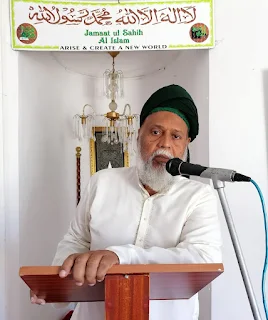Islam is a religion that is both temporal and
spiritual. This is because this religion emanates from the One Who created the
human being and Who knows, therefore, what suits him best. Allah, our Creator,
knows, in particular, what is necessary for the relations of man with his
fellows to be harmonious. For social relations to be good, they must be based
on right principles; it is necessary that the individual does not feel attacked
either in his physical person, or in his moral personality, so that a healthy
and united society is achieved.
Allah honoured the descendants of Adam (as) by endowing
them with reason, which should be able to lead man to faith in Allah: “Verily we have honoured the Children of Adam. We carry
them on the land and the sea, and have made provision of good things for them,
and have preferred them above many of those whom We created with a marked
preferment.” (Bani Isra’il, 17: 71)
This faith, this conviction, requires that we
recognize Allah and accept His Laws. Obeying Allah and His Laws is the
culmination of self-knowledge, as the Prophet (pbuh) said: “Whoever among
you knows himself best, knows his Lord best!” He who is convinced that
Allah is indeed the Creator and the Lord of the universe not only comes to have
admiration for the laws of Allah, but also to want to respect them, because he
knows that these laws are what is best for each individual and for society.
Many of these laws relate to social relations without
which there would be no human civilization. They govern the relationship of the
individual with himself, with his fellows, and with the universe in general.
General laws are useful; but, in everyday life, the
rules of convenience and good manners, which relate to details, are just as
necessary. One of the qualities of Islam is to contain both general laws and
precise rules of life.
Instincts exist in humans as in animals, it is true.
But, unlike the animal whose destiny is to obey its instincts, the human being,
who has been endowed with reason and a sense of responsibility, must be able to
control his instincts. It is not a question of “suffocating” them, but only of
making them speak wisely. Indeed, Man was not created solely to survive and
reproduce. Allah has assigned him and the Jinn a higher purpose: “I created the jinn and humankind only that they might
worship Me.” (Az-Zariyat 51: 57)










